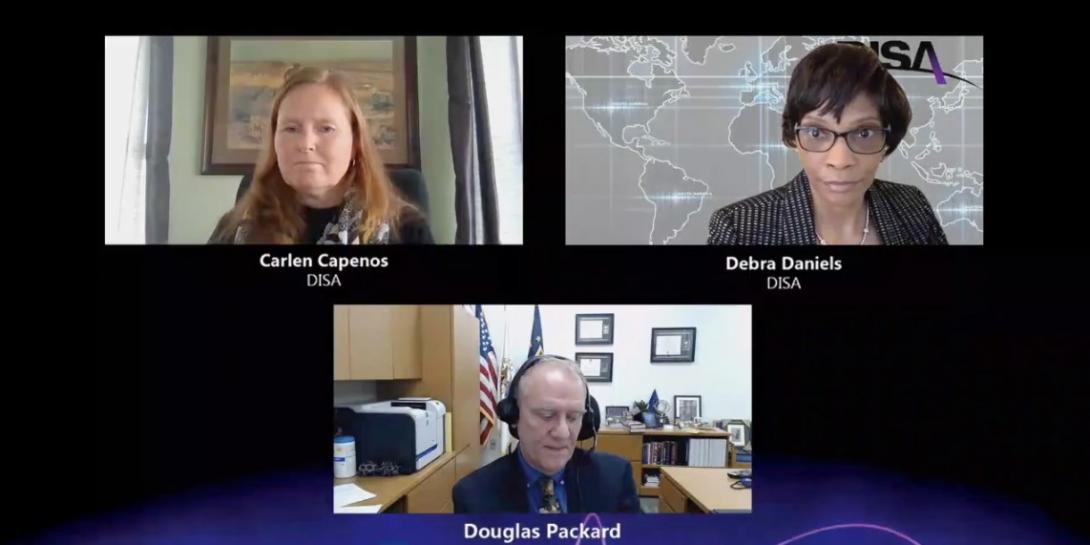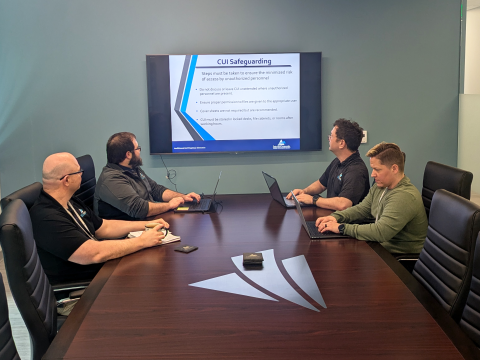Small Businesses Can Prosper with DISA
As a combat support agency, the Defense Information Systems Agency, or DISA, provides and operates key command and control, information, communication, and computing technologies for joint warfighters, national leaders, and other mission and coalition partners across the Defense Department. To provide such support, the agency relies on industry partners, and in particular, has specific contracting set-aside measures for small businesses, including small disadvantaged companies, women-owned firms, service-disabled veteran-owned corporations and historically underutilized businesses (HUBs).
DISA has a goal of awarding 28 percent of its contract spend to these types of businesses, reported Carlen Capenos, director, Office of Small Business Programs at DISA. Capenos spoke at the AFCEA TechNet Cyber conference on December 3, presenting the agency’s biannual Small Business Forecast to Industry, which details DISA’s forthcoming contracting opportunities for companies in fiscal years 2021 and 2022. On the panel, she was joined by Debra Daniels, Vice Procurement Services executive and Douglas Packard, Procurement Services executive, who also is the director of the Defense Information Technology Contracting Organization, or DITCO, the agency’s contracting arm.
“In FY20, we set five new records, which is even more exciting because last year we set seven new records,” Capenos noted. “That means we topped even more dollars awarded in the small business categories and higher percentages, coming off a record-setting year from last year. In our women-owned and HUB zones we hit the highest percentage and the highest dollars. That is really great. We also had the highest dollars awarded in the small disadvantaged group.”
Regarding service-disabled veteran-owned businesses, the agency had set a goal of awarding 5 percent of contracts to these companies in FY20, and reached 4.4 percent. Capenos explained that they had voluntarily increased this goal because they had done so well with this contracting category in the last several years. “And then we didn't make it,” she said. “But it is a good news-bad news story on that category. When we went back to look to see what happened, many of the service-disabled veteran-owned small businesses in FY20 became large businesses. So, that means this year we need to go back and recruit a little harder to find new service-disabled small businesses.”
Packard, who manages a portfolio of $17 billion at DITCO, outlined about a dozen contracting opportunities for FY21. In the third quarter of FY21, DISA expects to award a single contract to support classified operational assessments for the Chairman of the Joint Chiefs of Staff for the Nuclear Command, Control and Communications program. The agency will soon pursue a solicitation for digital engineering, an enterprise data environment, as well as for integrated workload management system support and a datalink service provider.
The agency is still forming the requirements for the U.S. Army’s Defensive Cyber Operations Project Management Office contract, which will supply a full range of cyber-related advisory assistance services and products for defensive cyber activities, Packard noted, adding that they plan to issue a request for proposals sometime in the second quarter of FY21.
As for contracting trends, DISA relies on two main contracting vehicles, the Encore III and the Systems Engineering, Technology and Innovation, or SETI contract, in addition to harnessing other transactional authority, or OTAs. Daniels reported that their top vehicles included the SETI Tier 1 contract with an estimated $555 million in awards planned for FY21 and the Global Services Management Operations II Tier 1 effort at $493 in FY20, followed by the Tier 1 CISCO Joint Enterprise License Agreement at $373 million. “These Tier 1 level contracts are agency specific,” Daniels stated. “And a lot of them, if we haven't yet done the contracting within DISA ourselves, we are creating them to meet our own mission needs. And as Carlen mentioned, for small business we do have this a DISA-first policy where we start with looking at set-asides for small businesses.”
In addition, the officials’ talks offered key tips for working with the agency—which apply to all companies, not just small firms. They also answered common questions DISA receives about contracting processes. Capenos advised firms to attend the agency’s small business contracting class, 101 Small Business Orientation, and urged companies “to do your homework” on what capabilities the agency actually needs.
To view the officials’ TechNet Cyber presentations, visit https://event-app.eventpower.com/event_app/display/index/20AFCEA-CYBER.
In addition, the DISA contracting leaders presented details on how to work with DISA during an AFCEA TechNet Cyber webinar this fall called Doing Business with DISA: Hot Topics in Contracting and Small Business.
Companies can review the biannual contracting forecast on DISA’s website. And to see how to schedule a product demonstration or get information on the agency’s use of OTAs, visit https://dreamport.tech/technical-exchange-meetings.php and https://dreamport.tech/call-for-white-papers.php.




Comments